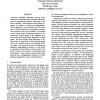Free Online Productivity Tools
i2Speak
i2Symbol
i2OCR
iTex2Img
iWeb2Print
iWeb2Shot
i2Type
iPdf2Split
iPdf2Merge
i2Bopomofo
i2Arabic
i2Style
i2Image
i2PDF
iLatex2Rtf
Sci2ools
IJCAI
2003
2003
On the Design of Social Diagnosis Algorithms for Multi-Agent Teams
Teamwork demands agreement among teammembers to collaborate and coordinate effectively. When a disagreement between teammates occurs (due to failures), team-members should ideally diagnose its causes, to resolve the disagreement. Such diagnosis of social failures can be expensive in communication and computation overhead, which previous work did not address. We present a novel design space of diagnosis algorithms, distinguishing several phases in the diagnosis process, and providing alternative algorithms for each phase. We then combine these algorithms in different ways to empirically explore specific design choices in a complex domain, on thousands of failure cases. The results show that centralizing the diagnosis disambiguation process is a key factor in reducing communications, while run-time is affected mainly by the amount of reasoning about other agents. These results contrast sharply with previous work in disagreement detection, in which distributed algorithms reduce communica...
Diagnosis Algorithms | Diagnosis Disambiguation Process | IJCAI 2003 | IJCAI 2007 | Teamwork Demands Agreement |
| Added | 31 Oct 2010 |
| Updated | 31 Oct 2010 |
| Type | Conference |
| Year | 2003 |
| Where | IJCAI |
| Authors | Meir Kalech, Gal A. Kaminka |
Comments (0)

